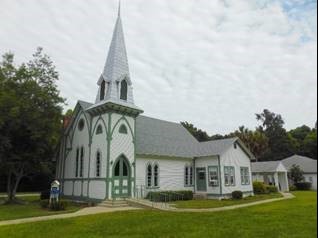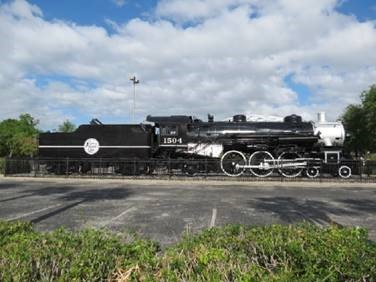
For Immediate Release
Monday, May 14, 2018
Contact: Sarah Revell
850.245.6522
[email protected]
Secretary Detzner Announces the Designation of Three Properties on the National Register of Historic Places
TALLAHASSEE, Fla. –
Secretary of State Ken Detzner announced today that Bethlehem Presbyterian Church in Archer, the Eugene Knotts House in Yankeetown and Atlantic Coast Line Railroad Locomotive #1504 in Jacksonville have been listed on the National Park Service’s National Register of Historic Places.
“These three historic resources listed on the National Register demonstrate the care Florida’s citizens have taken to protect some of the state’s valuable historic treasures,” said Secretary of State Ken Detzner. “From a surviving wooden nineteenth-century church, a mid-century modernist house and a World War One-era locomotive, Florida continues to add more historic properties to its diverse collection of National Register honorees.”
Bethlehem Presbyterian Church, located in Archer, Alachua County, Florida, is a Carpenter Gothic-style church built in 1884. The oldest church building in continuous use within the St. Augustine Presbytery, Bethlehem Presbyerian Church represents an important element of the earliest settlement and development of the community of Archer, and has played a crucial role in the railroad history of the town. The building is also architecturally notable for its steep pitched roof, pointed arched windows and doorways and its prominent steeple. In a state known for extreme conditions, over a century of dedicated care and love for the wood-frame building has helped the church remain intact to the present day.

The Eugene Knotts House, located in Yankeetown, Levy County, Florida, is a locally significant example of the mid-century Sarasota School of Architecture designed by master architects Jack West and Ralph Twitchell. The Sarasota School of Architecture is defined by the use of modernist features adapted to the heat and light of Florida’s tropical climate. The 1953 building’s flat roof, extensive use of glass and open floor plan attempt to blur the lines between interior and exterior space, embracing and mitigating the impact of the sun on the building and its occupants. The building’s construction incorporated the most up-to-date building materials and techniques of the time, and was designed specifically to complement its location. As one of the rare buildings of the Sarasota School to be built outside of the Sarasota region, the Eugene Knotts House is a rare resource. The Eugene Knotts House is currently a private residence.

Atlantic Coast Line Railroad Locomotive #1504, located in Jacksonville, Duval County, Florida, is the best surviving example of a United States Railroad Administration (USRA) P-S-A Pacific Passenger engine. The USRA pushed for standardized designs for steam locomotives, and fabricated 1,856 locomotives during the First World War following those plans. After the war, Atlantic Coast Line (ACL) Railroad Locomotive #1504 was used as a passenger service train on the ACL. Today, the locomotive is on display in the Prime Osborn Convention Center parking area. The convention center was formerly home to the Jacksonville Terminal of the ACL.

# # #
About The National Register of Historic Places
The National Register of Historic Places is a list maintained by the National Park Service which includes historical or archaeological properties including buildings, structures, sites, objects, and districts, that are considered worthy of preservation because of their local, statewide and/or national significance. Nominations for properties in Florida are submitted to the National Park Service through the Florida Department of State’s Division of Historical Resources. Florida has over 1,700 listings on the National Register, including 295 historic districts and 175 archaeological sites. There are more than 50,000 sites contributing to the National Register in Florida. For more information, visit flheritage.com/preservation/national-register. For more information about the National Register of Historic Places program administered by the National Park Service, visit nps.gov/nr.
About The Florida Department of State’s Bureau of Historic Preservation
The Bureau of Historic Preservation (BHP) conducts historic preservation programs aimed at identifying, evaluating, preserving and interpreting the historic and cultural resources of the state. The Bureau manages the Florida Main Street Program, and under federal and state laws, oversees the National Register of Historic Places program for Florida, maintains an inventory of the state's historical resources in the Florida Master Site File, assists applicants in federal tax benefit and local government ad valorem tax relief programs for historic buildings, and reviews the impact that development projects may have on significant historic resources. For more information, visit flheritage.com/preservation.

